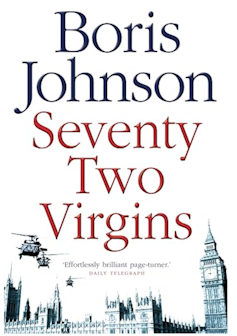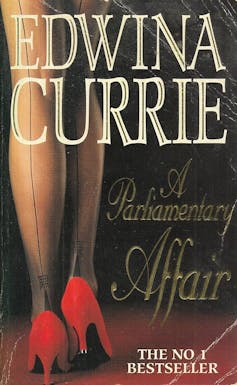Cleo Watson, former co-deputy chief of staff to Boris Johnson, was fined in the infamous “PartyGate” scandal involving gatherings held at government buildings while the United Kingdom was under a pandemic lockdown. The scandal ultimately saw Johnson step down as prime minister.
She’s the author of Cleavage, a saucy new novel set against the backdrop of contemporary Conservative British politics. Cleavage depicts an embattled Tory party limping towards a seemingly inevitable election loss. It is an interestingly timed release for those hoping current UK prime minister Rishi Sunak will win the upcoming July 4 election.
At a time when the Conservatives are desperately trying to distance themselves from their party’s reputation for scandal and sleaze, Watson’s novel lifts the curtain on it. She is the latest in a long line of Conservative figures writing popular fiction, often set against an explicitly political backdrop.
Near the beginning of her book, fictional ex-prime minister Lord Percy Cross gives a reading from his own salacious new historical novel, entitled The Loin King.
It begins with a Tudor king kicking himself free “from the tangled limbs of big-bushed stable girls” to discuss political business: the war with Spain, the imminent beheading of his ex-mistress, a plague that has broken out in parliament. When his Lord Chamberlain remarks the plague has been caused by vermin, the king quips, “the rats or the members?”
Percy tells an interviewer The Loin King is based on his time as prime minister: “I found being in Downing Street very much like a Tudor Court in atmosphere.” Then he adds, “By shoving everyone into corsets and ruffs, I’ve distorted the characters of anyone who might sue me for libel.”

Percy is, if anything, being remarkably cautious by setting his saucy political romp in a different time period – more cautious, perhaps, than many other political figures who have taken to writing fiction, including his creator.
Cleavage, as well as its predecessor Whips (2023), is set in Westminster against the backdrop of a Tory party in crisis: a setting that closely mirrors Watson’s former professional life.
Both her novels also feature scandalous sexual exploits. These range from two Tory and Labour candidates competing for the same seat undertaking a secret affair after matching on a hookup app, to the prime minister covertly watching power-lifting pornography, to the secretary of state taking questions from a committee with a vibrating love egg inside her.
The vermin here very much are the members.
British politicians and popular fiction
The tradition of British politicians writing popular (and sometimes scandalous) fiction can be traced to the 18th century. Matthew Lewis is now much better remembered for his 1796 Gothic novel The Monk – a dark and shocking tale of sexual obsession, murder, witchcraft and selling one’s soul to the devil – than for his six-year tenure as the MP for Hindon.
Inversely, the fiction of some extremely well known political figures has now all but been forgotten. Thinly veiled political allegorical novels such as former Conservative prime minister Benjamin Disraeli’s Vivian Grey (1826) and Winston Churchill’s Savrola (1900) are mere footnotes in their biographies.
It was in the 20th century, though, that scandal and Conservative politics really began to coalesce in popular fiction. Perhaps the most famous example is prolific author Jeffrey Archer – former deputy chairman of the Conservative Party, current member of the House of Lords, and locus of numerous scandals (including the one that sent him to prison for perjury). His books have sold more than 300 million copies worldwide.

He is not, however, the only example. Boris Johnson published a widely panned book in 2004 called Seventy-Two Virgins, about a hapless MP with tousled hair who manages to foil a group of terrorists targeting the US president on a visit to Westminster.
It was published, notably, a few months before Johnson was sacked from the shadow cabinet for having lied to the public about an extramarital affair.
Former Tory MP Louise Mensch is also known as Louise Bagshawe, the author of 15 novels with glamorous titles such as Tall Poppies (1997), Venus Envy (1998) and The Devil You Know (2003). These books are not set in the political world – rather, they are racy chick-lit, featuring women she describes as “feminist heroines making it on their own”.
Former party leader Iain Duncan Smith, meanwhile, published a political thriller, The Devil’s Tune, in October 2003. In the same week, he lost a vote of no confidence in his leadership. This was not connected to his book’s publication but, judging by the lacklustre reviews, it probably didn’t help.
And while current prime minister Rishi Sunak is yet to author a work of fiction – although polls currently suggest he might have time to after July 4 – he made headlines last year for stating that his favourite author was Jilly Cooper, the author of bonkbusters such as Riders (1985), Rivals (1988) and Polo (1991).
Cooper’s notorious protagonist Rupert Campbell-Black is a stalwart Tory who serves for several years as minister for sport – despite only getting into politics in the first place because he’s having an affair with a politician’s wife.
The politico-bonkbuster
The clearest forerunners to Cleo Watson – in the genre we have dubbed the “politico-bonkbuster” – are the works of former Tory MP Edwina Currie.

A Parliamentary Affair (1994) centres on a newly elected female Tory MP, Elaine Stalker, who embarks on an affair with her whip. It was later revealed to be a lightly fictionalised version of Currie’s own affair with the then future prime minister John Major, when he was her whip (from 1984–88).
Near the beginning of the book, Elaine’s lover-to-be introduces her to the world of Westminster, telling her there are “three occupational hazards of being an MP: the three As”: arrogance, alcoholism and adultery. He advises her, “As long as you succumb to only one, you’ll survive.”
On the surface, the Conservative Party regularly campaigns on ideas of good sense and family values: the “basics” of John Major’s ill-fated “back to basics” campaign in 1993. But the Tory politicians in these books rarely uphold these values, despite being characters written by Tory politicians.
In A Parliamentary Affair, once she has embarked on her affair, Elaine reflects:
How strange that she, who blithely entered Parliament with such strong views on the importance of traditional marriage and family, should find herself in this position […] maybe those principles were only codes of practice, to be modified and discarded at whim.
Speaking back

Both Currie and Watson were pushed out of their positions of power in Tory governments. Watson resigned during a power struggle in the chaos of Johnson’s prime ministership. Currie was forced to resign as Health Secretary due to a salmonella-in-eggs crisis (a moment so infamous she is referred as “the egg woman” in Watson’s Whips).
Both, then, perhaps have a vested interest in portraying a vision of the Conservative Party that is not necessarily flattering. However, it could be argued Currie and Watson’s books also offer an alternative vision of the party, one more friendly to the needs of women, racial minorities, and the LGBTQ+ community – amid the arrogance, alcoholism and adultery.
Taken broadly, though, these politico-bonkbusters reflect how the Tory party has been plagued by scandal – yet can’t seem to either stay away from it or stop talking about it, even if it damages the party’s reputation.

